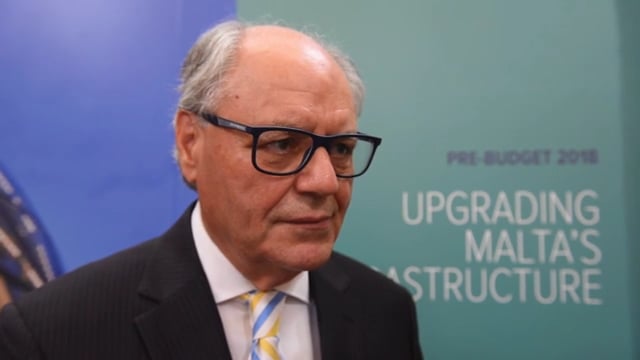[WATCH] Scicluna says ‘trust the market’ on Malta’s rising rental prices
Maltese finance minister Edward Scicluna rules out government intervention as rental prices soar


Finance Minister Edward Scicluna has resisted calls for government intervention in the rental market, saying market forces can be relied upon to stabilise soaring rent prices.
Speaking at a business breakfast in Valletta this morning discussing the pre-Budget document, Scicluna said the issue was “not a question of a speculative balloon that will explode like stock or property market, it's just a question of higher demand than supply that pushes up rents.”
Scicluna said 80% of properties were owner-occupied, “so I would be more worried about spikes in interest rates.”
Scicluna, was quick to emphasise the need for stricter regulation of rent contracts, however, commenting that some the stories he had heard were outrageous. “But regulation doesn't mean affecting the price.”
“There is nobody monitoring the relationship between a landlord and a tenant or observing whether landlords are evading tax,” he said.
The minister said Maltese society’s unfamiliarity with a rental culture was a factor in pricing. “In Malta we are not used to renting and tend to associate it with social housing. The free market has hit a number of people and it is painful.”
The minister said work must be done to Increase supply to match demand, “and the market will then adjust.”
Record surplus in current account
Deficits brought headaches but surplus brought the minister even more because of increased expectations, Scicluna joked about Malta’s €50 million external current account surplus.
“A surplus means fiscal space, you can see the debt declining,” he said, adding that Malta’s debt to GDP ratio was “exemplary”.
Scicluna said he was asked by a ratings agency why the country was not saving and said he explained that it was “lowering its debt exposure.”
“The proceeds from the IIP are going into an account with a board of directors who are very responsible and investing in a portfolio that will leave something for future generations other than debts.”
Scicluna also spoke of the burgeoning problems of economic growth, such as waste management. “We have a big political choice to make, the problem of space and ODZ we have to make bold decisions as to whether we want to sacrifice more pristine areas close to Maghtab or find other solutions.”
Tackling tax evasion
Scicluna referred to a joint enforcement task force to tackle tax evasion by business owners, recently set up to look into the allegations reported in the media.
Taking questions from the floor, the minister heard PKF senior partner George Mangion argue how tax evasion in restaurants was partly down to excessive competition and high rents, which lead restaurateurs to engage employees from non EU countries, at rates that fell below the minimum wage.
“I think we have grown so fast that we're like a teenager who is uncomfortable with the speed of growth. We’re not used to big buildings, think or fear it is just a dream. It is a question of coping with growth, not fearing it will not last," Scicluna said.
He disagreed with the suggestion that a growth ceiling may be reached.
“The challenges are there. I've just come from Ecofin where France, because of its experience with companies not paying tax, is looking for a short-term fix. This measure is very difficult to implement because we are used to taxing profits not revenue – but we want to tax some digital industries on the revenue in the country of origin and it's revolutionary.
“Malta’s stand is that it is conscious that people have to pay tax somewhere.”
GRTU director-general Abigail Mamo, in an intervention, criticised the six-sevenths tax rebates offered to the financial services industry. “We lay out the red carpet to foreigners. The 30% rebate out of 35% tax rate cat is out of the bag and foreigners are flocking here, putting local business at a huge disadvantage,” Mamo said.






.jpg)















